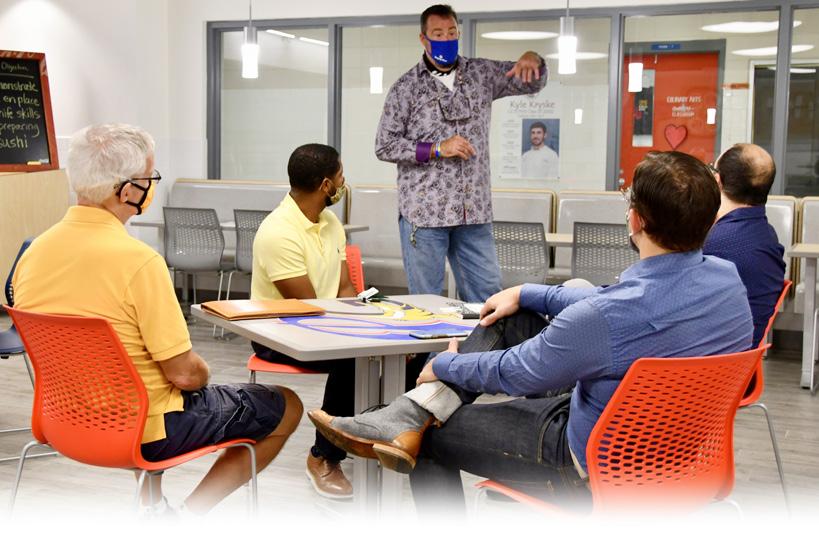
3 minute read
Neshoba Students Explore Potential Welding Careers
Reid Hall takes a lot of pride in his projects in the welding and cutting technology program at Neshoba Central High School (NCHS).
One look at any of the senior’s fire pits in the school shop would demonstrate his expertise.
Hall is one of eight students enrolled in the welding and cutting technology program’s Construction Core night class taught by Derek Huffman. Four others are enrolled in a Welding Level I night class taught by Joey Irby in the career and technical center.
Hall and a few others plan to continue in the program at East Central Community College (ECCC) after graduation.
Upon successful completion, they will earn national recognition certification credentials.
“This is another outstanding opportunity for our students to add more credentials before they leave NCHS,” said Neshoba County Superintendent of Education Lundy Brantley. “The more credentials a student has, the better chance they have of competing at a high level, whether they enroll in college, enlist in the military or seek employment.”
Hall, who will also play baseball at ECCC, is a third-year student in NCHS’s Agriculture and Natural Resources class in addition to being enrolled in the night class.
“He learned to weld as part of our program,” Huffman said.
The fire pits, which sell for $350, feature various designs, from Ole Miss and Mississippi State logos to Rockets and family last names.
Huffman’s students are currently making a fire pit for a deer camp with a hunting theme.
“We can do any design,” he said.
Hall hopes to earn a certificate in welding from ECCC.

Above: Neshoba Central High School (NCHS) senior Reid Hall poses with a fire pit he has made in the school’s welding and cutting technology program. Hall is one of eight students enrolled in the program’s Construction Core night class taught by Derek Huffman. Opposite page: Huffman (left) provides guidance to Hall on a weld in NCHS’s welding and cutting technology shop.
When asked where his dream job would be after completing his studies, Hall said: “Anywhere that pays good!”
Huffman described Hall as a very detail-oriented welder.
“He has the patience to take a project and weld it up,” Huffman said. “He is going to do it well enough to make sure it is right. He takes pride in what he does. If his welds don’t look right, he is going to be more bothered by it than anybody else.”
Next semester, Huffman’s students will move to Welding Level I.
Construction Core is taught through online modules that cover areas such as employability, communication skills, job interviews, résumés and safety.
The students are working on a National Center for Construction Education and Research certification.
“This is basically to get them one step closer to being done when they go to East Central or whatever college they NCHS’ Joey Irby (second from left) is joined by sophomore Bryson Smith (l-r), sophomore Jalandon Williams and junior Jardan Sanders in the school’s welding shop. Irby teaches a Welding Level I night class at the school’s career and technical center.


Huffman (left) assists senior Ken Burks with his work on a fire pit.

Irby (right) and sophomore Luke Wilborn pose in the school’s welding shop.
chose,” Huffman said. “They have already gotten Core and Level I out of the way. Then they can start on Level II and work up to whatever the community college level requires.”
Several of Huffman and Irby’s students have gone through ECCC and now work as certified welders.
Huffman said some of his current students plan a career in welding, while others are just trying to learn something different.
“Welders make good salaries,” he said, noting that some of his students worked at Taylor Machine, B&G Equipment and Windham Tractor & Implement Co., among others.
Irby encourages students to take welding even if it is not their chosen career.
“I grew up on a dairy farm and we had welders and cutters to repair things,” he said.
Irby said welders commonly start around $18 an hour.
“Over time, they can make $25 to $30 an hour,” he said.










